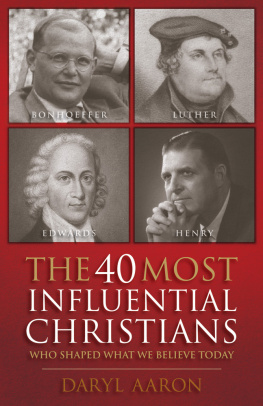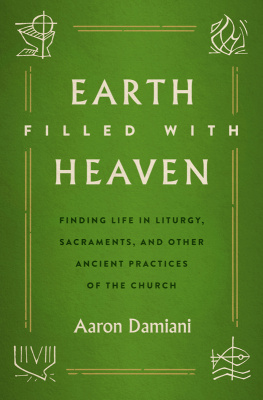Contents
Cover
Half Title Page
Title Page
Copyright Page
Dedication
Introduction
1. What Is Theology?
Section 1: The Bible
2. God Makes Himself Known
3. The Bible Is Gods Word
4. What Are the Implications of the Bible Being the Word of God?
5. What Are Other Implications of the Bible Being Gods Word?
Section 2: God
6. What Characteristics of God Make Him Unique?
7. What Other Characteristics of God Make Him Unique?
8. What Characteristics of Himself Does God Share With Humans?
10. Did God Really Make Everything?
11. How Does God Work in the World?
Section 3: Created Beings and Sin
12. What Are Angels and Demons?
13. What Does It Mean to Be Human?
14. Soul, Spirit, and Body
15. What Is Sin?
16. What Is Original Sin?
Section 4: Jesus
17. Jesus Christ Is God
18. Jesus Christ Is Human
19. How Can Jesus Be Both God and Man?
20. What Has Jesus Christ Done for Us?
21. Is the Resurrection of Jesus Really That Important?
22. What Does It Mean to Say That Jesus Is Lord?
Section 5: The Holy Spirit
23. Is the Holy Spirit a Person or Thing?
24. How Does the Holy Spirit Help Christians?
25. What Are the Gifts of the Spirit?
Section 6 : Salvation
26. Jesus Saves
27. How Does God Choose Who Will Be Saved?
28. Did Jesus Die for Everyone?
29. How Does a Person Become Saved?
31. Can Christians Lose Their Salvation?
32. Is Jesus the Only Way to Be Saved?
Section 7: The Church
33. What Is the Church?
34. How Is the Local Church to Be Governed and Led?
35. What Is the Significance of Baptism?
36. What Is the Significance of the Lords Supper?
Section 8: Last Things and Heaven
37. Is Jesus Really Coming Back?
38. When Is Jesus Coming Back?
39. What Will Happen When Jesus Comes Back?
40. What Will Heaven Be Like?
Epilogue
Notes
Back Cover
Section 1: The Bible
God Makes Himself Known
W e can know God for one reason only: God has made himself known. If God had not chosen to do this, we could not have known him. That is, God is not accessible through our senses, our reason, our experience, or any other means apart from his willingness to be accessible. Our knowledge of God is absolutely dependent upon divine revelation; and not only is he willing to be known, he desires to be known.
The term revelation comes from the Greek word apocalupsis (also the title of the New Testaments last book), which means an uncovering or revealing of something that was previously unknown. The doctrine of revelation, then, means we can know God because he has chosen to make himself and his works known.
There are two kinds of divine revelation: general and specific.
General Revelation
General revelation refers to knowledge of God that is available to all people of all times and all places. Such knowledge comes in three ways.
First, general revelation comes through nature , that is, through what God has made. Psalm 19:1 says, The heavens declare the glory of God; the skies proclaim the work of his hands. God communicates through his creation. Paul writes, Since the creation of the world Gods invisible qualitieshis eternal power and divine naturehave been clearly seen, being understood from what has been made, so that people are without excuse (Romans 1:20). Some of Gods nature can be clearly seen through his works. This is not just communication but clear communication, which is why people are without excuse. Everyone should see the degree to which God is revealed through nature.
Second, general revelation comes through human beings, that is, those who bear Gods image. This would include, for one thing, a sense of the divine. In the verse before Pauls statement about what can be known of God in nature, he says, What may be known about God is plain to them, because God has made it plain to them (Romans 1:19). God has placed within all humans an inner sense of his existence, and he has made this plain.
All humans have a sense of the eternal as well. Ecclesiastes 3:11 says, He has also set eternity in the human heart. This means we all have a God-given inner sense that there is more than just the here-and-now; there is an eternal realmGods realm.
As Paul shows, all humans also have a God-implanted sense of morality:
When Gentiles, who do not have the [written] law, do by nature things required by the law, they are a law for themselves, even though they do not have the law. They show that the requirements of the law are written on their hearts, their consciences also bearing witness, and their thoughts sometimes accusing them and at other times even defending them.
Romans 2:1415
This moral sense is the human conscience, a reflection of God, who himself is the moral standard. He has written his laws on our hearts.
Third, general revelation comes through history , that is, how God works in time and space. This is what Daniel had in mind when he said that God changes times and seasons; he deposes kings and raises up others (Daniel 2:21; see also Job 12:23; Acts 17:26). History is the working out of Gods plans and purposes, and whether we know it or not, we experience and observe his work in all current events.
So through at least these waysnature, humans, and historyGod has made himself known to all people. Everyone everywhere knows that the one true God exists and knows something about him. As Paul makes clear, all people are accountable for this knowledge (without excuse, Romans 1:20), but tragically, all suppress the truth by their wickedness (Romans 1:18).











